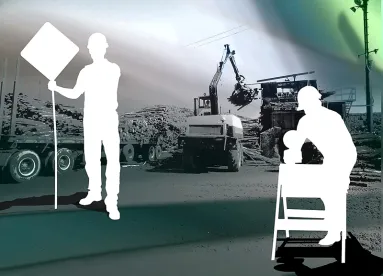Many states, counties, and cities have issued “stay at home” or “shelter in place” (collectively, SIP) orders to combat the spread of COVID-19. We continue to focus on the impact these sweeping orders could have on new and ongoing construction projects in Alabama, Florida, Georgia, Louisiana, Mississippi, and Texas. As with all the effects of COVID-19, the issuance, interpretation, and enforcement of these orders are fast-breaking and in constant flux.
DHS Cybersecurity and Infrastructure Security Agency Guidelines
A threshold question to evaluate the impact of an SIP order on a construction project is whether your operations and workforce impact “essential” or “critical” infrastructure. Many states and localities are incorporating the Guidelines published by the Department of Homeland Security’s Cybersecurity and Infrastructure Security Agency (CISA) to help identify “essential critical infrastructure workers” for exemption from SIP restrictions.
Initially, the Guidelines did not specifically address the construction industry. With pressure from the Association of General Contractors of America (AGC), CISA clarified the Guidelines on March 28, 2020 (Revised Guidelines) to identify construction activities in 25 different sections — compared with only four times in the previous version. The AGC commented, “This new federal guidance should help eliminate the confusion and ambiguity that has led several state and local officials to needlessly order halts to construction activity that is clearly essential.”
CISA restated its position that the Guidelines and the Revised Guidelines are not federal directives, but instead are recommendations intended to help state and local officials make decisions about essential workforce categories with deference to the specific COVID-19 concerns in their jurisdictions.
ALABAMA:
UPDATED AS OF 3/30/2020: On Friday, March 27, 2020, the governor and the Alabama Department of Public Health issued a statewide Amended Public Health Order limiting meetings of 10 people or more and requiring certain “non-essential businesses” be closed to the public. However, employees are still permitted to report to work at these non-essential businesses. Importantly, the Amended Public Health Order does not apply to the construction industry. All non-essential businesses subject to this order are listed in the Amended Public Health Order.
In addition to the statewide order, Birmingham’s mayor also approved an SIP order, which similarly does not apply to construction activities.
Although arguably more stringent, the Birmingham order includes a specific carve-out for construction activities for essential infrastructure. The order also specifically lists the following as work excluded from the order: construction of commercial, office, and institutional buildings; residential building and housing construction; airport construction; port operations and construction; and road and highway construction.
FLORIDA:
UPDATED AS OF 4/1/2020: On April 1, 2020, the governor of Florida issued the first statewide safer-in-place order, effective April 3, 2020, through April 30, 2020. This order prohibits gatherings of 10 or more persons in public places. The order adopts the guidelines set forth in Miami-Dade County’s order for closing non-essential businesses. Therefore, “open construction sites” are considered essential and may remain open. Further, architectural and engineering businesses are also essential.
In addition, below is a non-exhaustive list of the counties and cities in Florida that issued SIP orders prior to the April 1, 2020, statewide order:
Miami-Dade County (Miami) (effective March 24, 2020)
-
“Open construction sites” are considered essential businesses and may remain open under both the County and City of Miami orders. In addition, architectural and engineering businesses are also essential. Miami-Dade has been issuing frequent amendments adjusting its order. Keep track at this Miami-Dade webpage.
Broward County (Fort Lauderdale) (effective March 23, 2020)
-
As with the Miami-Dade order, open construction sites are allowed to remain open, and architectural and engineering businesses are considered essential. The Broward order includes a limitation, however, that the architectural/engineering business may operate only for ongoing construction projects. Keep track at this Broward County webpage.
Alachua County (effective March 23, 2020)
-
This order provides that “Residential and Commercial related construction, including repairs to existing structures and construction projects which are in progress[,] are allowed to continue to completion. … Commencement of new construction is not permitted.” It allows construction under “Essential Infrastructure” as follows: “construction required in response to this public health emergency, hospital construction, and construction of medical facilities and public works construction.” The order also deems businesses providing architectural or engineering services to be essential, but again only with regard to ongoing construction projects. Keep track at this Alachua County webpage.
Orange County (Orlando) (effective March 26, 2020)
-
As with the Miami-Dade order, open construction sites are allowed to remain open, and architectural and engineering businesses are considered essential. Unlike the Miami-Dade order, there is no limitation that the architectural/engineering business may operate only for ongoing construction projects. Keep track at this Orange County webpage.
Hillsborough County (Tampa) (effective March 27, 2020)
-
This order allows people to leave their residences for purposes of providing any services or performing any work necessary to operate, maintain, and repair Essential Infrastructure. Among other things, Essential Infrastructure includes “construction.” Keep track at this Hillsborough County webpage.
GEORGIA:
UPDATED AS OF 4/3/2020: Governor Kemp issued a statewide SIP order on Thursday, April 2, 2020, that goes into effect on Friday, April 3, 2020 at 6:00 pm. The order exempts construction, as part of essential infrastructure, from the SIP requirements through its incorporation of the most recent CISA guidelines described above. This order also specifically indicates that it overrides any conflicting orders issued by county or municipal governments.
Governor Kemp’s statewide order comes over a week after Atlanta Mayor Bottoms, on March 23, 2020, issued an order for the city of Atlanta, separate from the statewide order. Just as with the statewide order, there is no provision limiting construction activities (again, aside from needing to stay at least six feet apart). Please note that the original text of Atlanta’s order created confusion because of an omitted comma, which has since been corrected. (The original order exempted only “public works construction…,” but has since been changed to exempt “public works, construction…”). The Atlanta order is in effect from midnight on March 24 until midnight on April 7.
LOUISIANA:
The governor issued a statewide SIP order that went into effect at 5 p.m. on March 23, 2020. The order directs all Louisiana residents and businesses to limit movements and operations beyond “essential needs” and “Essential Worker Functions.”
Based on our firm’s research and communications with both state and local officials, as of today:
-
The governor has confirmed that commercial and industrial construction operations may continue.
-
Any additional enforcement actions by Orleans or Jefferson Parish to shut down or limit construction activities will be in reaction to complaints and not proactive enforcement by authorities.
-
No other local parish or city official in Louisiana that we are aware of has indicated that any specific ongoing construction operations will be limited or suspended.
Importantly, the implications of the governor’s recent order continue to rapidly evolve, and thus clients should consult with local officials, trade associations, counsel, and other resources before making any decision with respect to their new and ongoing construction operations.
MISSISSIPPI:
UPDATED AS OF 4/2/2020: On April 1, 2020, Governor Reeves issued Executive Order 1466, which is a statewide SIP order. Just as with the governor’s previous March 24, 2020, executive order, construction is exempt from the new requirements and is allowed to continue as an essential business.
Numerous municipalities in Mississippi have also issued orders related to COVID-19. Some of those orders make exceptions for construction activities, and others do not. The Mississippi Emergency Management Agency also continues to update its list of local city and county COVID-19 orders.
-
Oxford, Mississippi (effective for 15 days from March 22): “[A]ll nonessential businesses and business functions … shall be closed to the public.” The only construction-related exception to this closure is for services necessary for “essential operation of residents (plumbers, electricians, landscapers, HVAC services, and the like).”
-
Tupelo, Mississippi (effective March 21 through March 28): An SIP order prohibits all travel, other than to “essential businesses.” Construction services, however, are considered essential.
-
Natchez, Mississippi (effective for 15 days from March 25): A resolution, very similar to Oxford’s, closes all businesses not deemed essential and makes the same limited exception for services necessary for “essential operation of residents (plumbers, electricians, landscapers, HVAC services, and the like).”
TEXAS:
UPDATED AS OF 4/1/2020: On March 31, 2020, Governor Abbot issued Executive Order GA-14 (effective through April 30, 2020), extending social distancing policies implemented under Executive Order GA-08 (March 19, 2020). While not adopting the title “stay at home” or “shelter in place,” GA-14 provides that “all services should be provided through remote telework from home unless they are essential services that cannot be provided through remote telework.” Essential services consist of everything listed in the CISA Revised Guidelines described above.
Importantly, GA-14 also provides that it “supersede[s] any conflicting order issued by local officials . . . to the extent that such a local order restricts essential services allowed by this executive order or allows gatherings prohibited by this executive order.” As such, the Texas construction industry is now essentially allowed to proceed to the extent the project falls under the CISA Revised Guidelines. We expect to see amended orders issued by local officials in the coming days to align with this new statewide order.
GA-14 also provides that “[o]ther essential services may be added to this list with the approval of the Texas Division of Emergency Management (TDEM). TDEM shall maintain an online list of essential services, as specified in this executive order and in any approved additions. Requests for additions should be directed to TDEM at EssentialServices@tdem.texas.gov or by visiting www.tdem.texas.gov/essentialservices.”
In addition, below is a non-exhaustive list of Texas counties and cities that have issued similar SIP orders:
Dallas County (Dallas) (effective March 23 through April 3, 2020)
-
Dallas County issued a new order directed at construction activities in an attempt to clarify that construction is essential and the “Stay Home, Stay Safe” order was not intended to stop commercial construction activities. The order provides that “construction for public works, residential, commercial, and schools” relates to critical infrastructure and is deemed essential. “Elective additions and maintenance are prohibited.”
Further, it provides various requirements for all general and subcontractors, including mandatory temperature checks before workers leave home; soap, water, and hand sanitizer at the workplace; rest breaks every four hours; at least one working, flushing toilet for every 15 workers on-site and one outdoor portable toilet for every 10 workers on-site. General and subcontractors must have a designated COVID-19 safety monitor on each site, and that person must have the authority to enforce the rules in the order. It also prohibits employers from taking adverse action “against an employee who has been quarantined, or advised to self-quarantine, due to possible exposure to coronavirus.” Finally, it makes the general contractor at a site responsible for compliance by all subcontractors. If an entity fails to comply, “the general contractor and non-compliant subcontractor can be removed from the essential business list.”
-
Construction falls under Essential Businesses for “public works construction, residential and commercial construction,” but this is under the rubric of the CISA critical infrastructure sectors. The Dallas order was the first to be issued in Texas. Later orders, including for Bexar County and Harris County, have not tied the construction industry solely to critical infrastructure.
Travis County (Austin) (effective March 24 through April 13)
-
The language of the Austin city order is more limited than Dallas County’s. The exemption is limited to construction focusing on public works, affordable housing, and social services, and construction supporting essential uses, essential businesses, government functions, or other critical infrastructure. Indeed, according to news reports, city officials stated that “there will be no commercial construction, except in limited exceptions where it’s constructing essential and critical assets. Construction will be allowed for public works and residential purposes if it meets the other criteria, like affordable housing, etc. Several City of Austin capital improvement projects are categorized as critical infrastructure under the public works clause and will continue construction.” If you are constructing in Austin, watch for this to develop as numerous industry groups petition city hall.
Bexar County (San Antonio) (effective March 24 through April 9)
-
Both the City of San Antonio and Bexar County orders include “construction” among the list of Exempted Businesses, specifically, allowing “[b]usinesses related to public works construction, construction of housing, and commercial construction” as well as transportation construction to continue to operate.
Harris County (Houston) (effective March 24 through April 3)
-
Harris County’s order mirrors the Bexar County order, providing “construction” among the list of Exempted Businesses and allowing “public works construction, construction of housing or other types of construction including commercial” as well as transportation construction to continue to operate.






 />i
/>i
